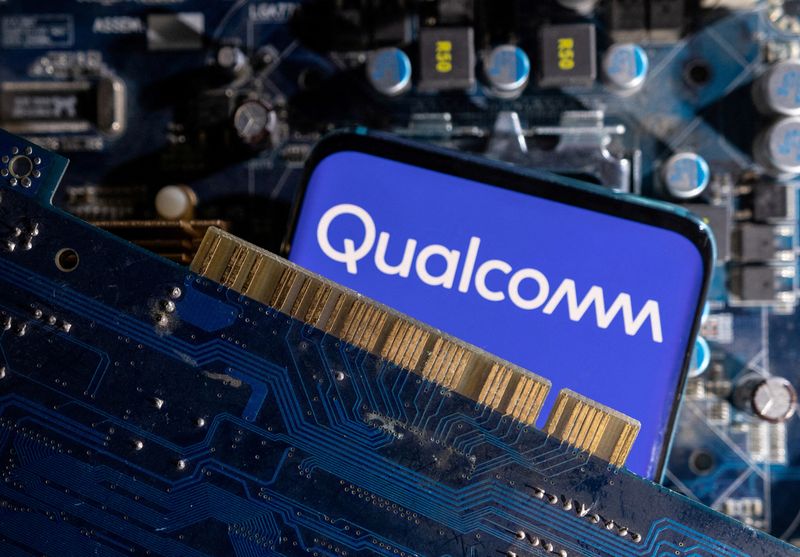
By Tom Hals
WILMINGTON, Delaware (Reuters) -Qualcomm’s central processors are properly licensed under an agreement with Arm Holdings, a jury found in a trial in U.S. federal court that removed some, but not all, uncertainty around the mobile chipmaker’s expansion into the laptop market.
A week of courtroom arguments and deliberations ended in a mistrial after the jury failed to resolve one of three questions put before it in the trial between the two chip giants. Qualcomm said the result affirmed its right to innovate, but Arm vowed to seek a new trial.
Arm’s shares were down 1.8% in extended trading after the news, and Qualcomm’s shares were up 1.8%.
The outcome means the case could be tried again in the future – something Arm vowed to pursue in a statement following the verdict. Judge Maryellen Noreika, who presided over the case in U.S. federal court in Delaware, encouraged Arm and Qualcomm to mediate their dispute.
“I don’t think either side had a clear victory or would have had a clear victory if this case is tried again,” Noreika told the parties.
After more than nine hours of deliberations over two days, the eight-person jury could not reach a unanimous verdict on the question of whether startup Nuvia breached the terms of its license with Arm.
But the jury found that Qualcomm – which purchased Nuvia for $1.4 billion in 2021 – did not breach that license.
The jury also found that Qualcomm’s chips, created using Nuvia technology and central to Qualcomm’s push into the personal computer market, are properly licensed under its own agreement with Arm, clearing the way for Qualcomm to continue selling them.
“The jury has vindicated Qualcomm’s right to innovate and affirmed that all the Qualcomm products at issue in the case are protected by Qualcomm’s contract with Arm,” Qualcomm said in a statement.
An Arm spokesperson said the company was “disappointed” that the jury was unable to “reach consensus” about the company’s claims and said from the outset the goal has been to protect the company’s intellectual property.
For now, the outcome paves the way for Qualcomm to continue to push what it calls the “AI PC” in laptop chips that are aimed at handling tasks such as chatbots and image generators. That is a market where Nvidia, Advanced Micro Devices and MediaTek are also planning to make Arm-based processors.
“My biggest worry was what happens to the future roadmap if they (Qualcomm) no longer have access to Nuvia (computing) cores,” Bernstein analyst Stacy Rasgon said. “At this point, that risk is a lot closer to being off the table.”
The dispute between Arm and Qualcomm centered on what royalty rate Qualcomm should pay for each chip. Nuvia was set to pay higher rates than Qualcomm before Qualcomm bought the startup firm and wove its technology into chips under its own license with Arm at lower royalty rates.
Ben Bajarin, chief executive of tech consulting firm Creative Strategies, said that Arm’s current growth projections have not depended on reaping higher rates from Qualcomm as Arm chips enter the PC market.
“They haven’t factored in, via their quarterly (earnings) calls, a win,” Bajarin said. “So none of this changes their economic upside. It’s really just a matter of contractual argument.”
However, the trial’s outcome leaves open the question of where Arm’s technology begins and ends. Arm licenses its computing architecture to firms but also sells designs for computing cores as off-the-shelf products.
Some of Arm’s more sophisticated customers, such as Apple, Qualcomm and Nuvia, license Arm’s architectures but develop their own custom cores. During the trial this week, Arm’s attorneys insisted its architecture license terms with Nuvia gave it rights to demand the destruction of Nuvia’s custom core designs.
“This does have ramifications for the entire industry,” Jim McGregor of Tirias Research said in an interview. “Whether you’re using a standard Arm core, or developing your own Arm core, it has been the rock of everything from electric toothbrushes to satellites.”
(Reporting by Tom Hals in Wilmington, Delaware and Max Cherney in San Francisco; writing by Stephen Nellis; Editing by Chizu Nomiyama, Pooja Desai and Rosalba O’Brien)
EMEA Tribune is not involved in this news article, it is taken from our partners and or from the News Agencies. Copyright and Credit go to the News Agencies, email news@emeatribune.com Follow our WhatsApp verified Channel




